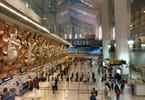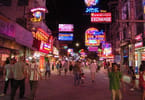First there were highwaymen and pirates who harassed travelers and lent an air of uncertainty and danger to the travel experience. Privateers, train and coach robbers, carjackers; all of these have flourished over time and have, every once and a while, pulled off a heist that has captured the public imagination. Some of these incidents have had a political motives, but most were undertaken for financial gain—sometimes with substantial rewards.
In some ways, air travel changed that dynamic. It is virtually impossible to intercept an aircraft in flight and make off with the loot. However, while on the ground, as has been recently demonstrated again, high value cargo can be stolen despite stringent security.
Yet until the 1960s, once an aircraft was airborne, the risk of external interference was minimal. And then came the Cuban revolution when hijackings became almost commonplace and were often regarded as a bit of unexpected adventure by many involved.
But things get much worse.
I joined Swissair in the spring of 1971, just months after SR100, along with a BOAC and TWA aircraft were hijacked by a Palestinian group. The aircraft were flown to a remote location in Jordan and eventually destroyed. With this event aviation entered a very different and sinister global niche. There still were rather routine criminal events—the infamous D.B. Cooper’s bail-out heist remains both unsolved and the source of endless speculation, but many of the subsequent occurrences involved high stakes and bloodshed.
On September 11, 2001, the ante was upped in ways that no one really expected—despite warnings and speculation that just such an event was do-able. All of us who travel are acutely aware of the extraordinary and sometimes mindless precautions that have been sequentially implemented. Not only has travel been made far more arduous, but the programs put in place also carry enormous costs for airlines, governments and travelers alike. Whether or not the process can or will be improved is anyone’s guess. Many thought it would be hard to imagine the situation getting any worse.
And yet this week, in a very subtle way, it did. Armed gunmen kidnapped the Captain and First Office of a Turkish Airlines flight in Beirut. The assault happened off the airport, on a city street as the crew was enroute to their hotel. Those claiming responsibility seem to be seeking a prisoner exchange. In and of itself, the kidnapping was not especially noteworthy. Across the world countless persons have been taken as bargaining chips in all manner of disputes, but this is the first time that commercial aviation personnel have been targeted, again showing the vulnerability of aviation in the political milieu.
Thousands of air-crew are deployed every day across the globe and many of them are flying to, and overnighting in, places where political instability is acute. Obvious danger spots like Damascus are no longer destinations but the conflict there probably has some direct links to the kidnapping of the THY crew members. The danger to these regular visitors extends far beyond national boundaries and poses new worries—and doubtless expense—for the aviation community.
This is truly a frightening escalation of “collateral” damage that directly impacts the industry worldwide and adds yet one more wild card to a deck that is already badly stacked for the industry. We all need to hope for an outcome that discourages similar acts in the future.
WHAT TO TAKE AWAY FROM THIS ARTICLE:
- Across the world countless persons have been taken as bargaining chips in all manner of disputes, but this is the first time that commercial aviation personnel have been targeted, again showing the vulnerability of aviation in the political milieu.
- This is truly a frightening escalation of “collateral” damage that directly impacts the industry worldwide and adds yet one more wild card to a deck that is already badly stacked for the industry.
- I joined Swissair in the spring of 1971, just months after SR100, along with a BOAC and TWA aircraft were hijacked by a Palestinian group.





















